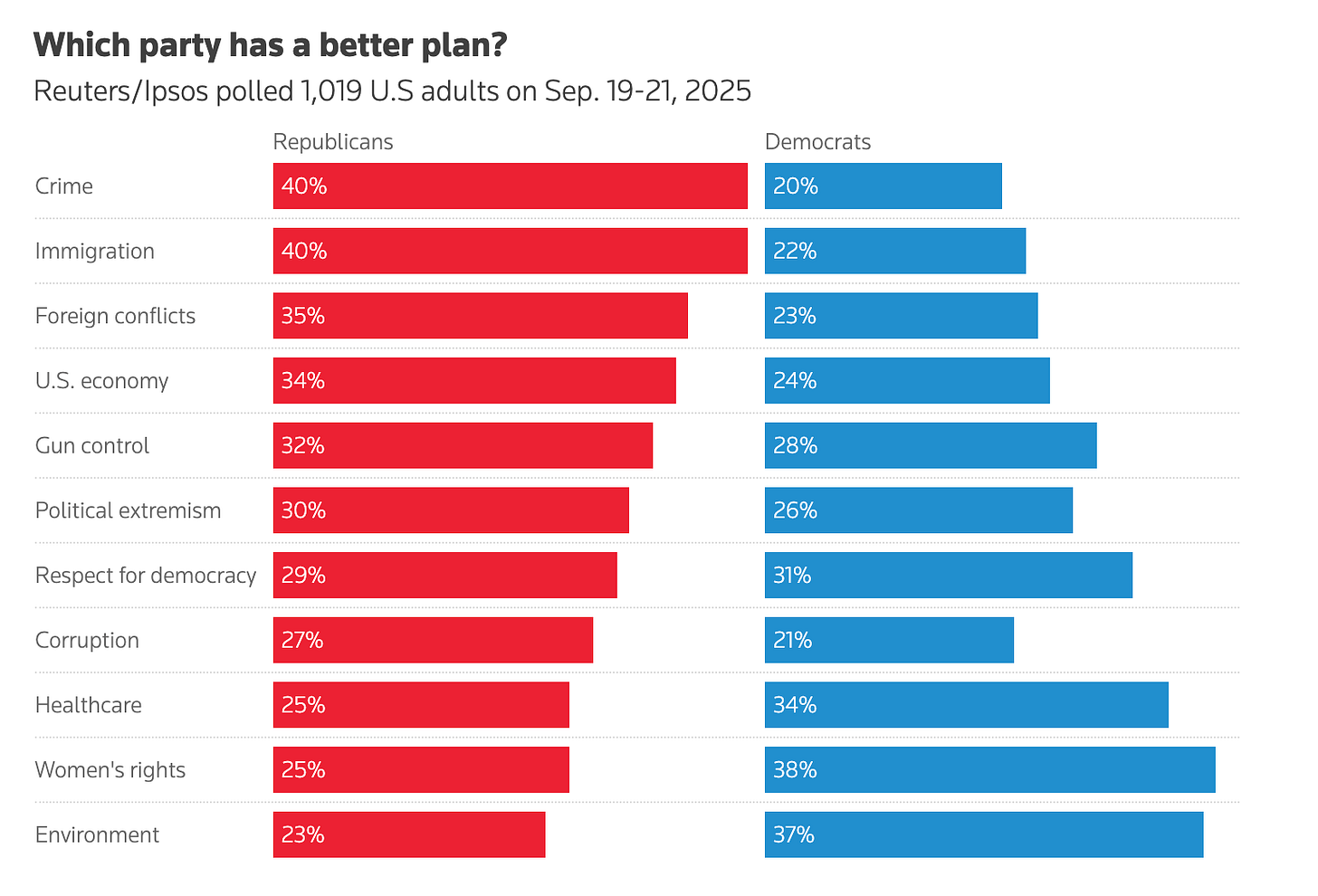Democrats' Credibility Dies in the Chaos
Chaos—or the perception of chaos—kills Democrats' credibility while extending Trump's political longevity.
Tune in to our next premium subscriber-exclusive Zoom call, featuring Palestinian, Israeli, and American perspectives on the war in Gaza amid the second anniversary of the October 7 attacks. Next Tuesday, 10/7 at 5pm ET/2pm PT. Register here.
It would be impossible to have missed Donald Trump’s speech to military leaders this morning, threatening American cities with war. Or how ICE agents fired pepper balls at journalists outside Chicago. Or the DOJ’s politicized indictments against former FBI Director-turned-Trump critic James Comey last week. Amid this and other authoritarian abuses, you probably don’t want to read a critique of Trump’s opponents in the Democratic Party. I wasn’t terribly eager to write one.
But we need a reality check about the anti-Trump camp. The United States has two parties. As of today, these parties’ main representatives can best be described as traitors and losers respectively. While I think this country could benefit from a third viable option, these are the choices Americans have, so anyone who cares about stopping the traitors needs to understand why the losers lose.
Back in April, a conservative activist, Savannah Craven Antao, was filming a “man on the street”-style interview in New York. Another woman approached Antao and socked her in the face, leaving Antao bloodied.
Now, New York prosecutors have dropped their case against the attacker. The office of Manhattan District Attorney Alvin Bragg, a Democrat, apparently missed a filing deadline (give me a break). And yes, this is the same Alvin Bragg who led one of the criminal cases against Donald Trump.
First of all, this is just a gross abdication of responsibility on the part of a public servant. Second, it feeds into the sense of chaos that deflects attention from Trump’s own actions.
We know that Donald Trump is broadly unpopular. Yet voters trust his Republican Party where it counts the most. Consider the Reuters-Ipsos poll from earlier this month.
When Americans are asked which party has a better approach on crime, Republicans lead 40% to 20%. Immigration 40/22. Economy 34/24. Sure, Democrats lead (by a paltry two points) on the issue of “respect for democracy,” but “respect for democracy” isn’t something you can see, smell, taste, an touch the way you might viscerally feel unsafe in your neighborhood or how you would experience more or less financial security.
You can look at these numbers and rant and rave about how the median voter is uneducated or under-informed. That Trump, the convicted felon who pardoned his personal legions of insurrectionists, cannot seriously talk about law and order.
It won’t do any good.
And it’s not like the Democrats are lagging on questions of public safety and the economy because they’re too busy fighting Trump. Despite the nature of America’s constitutional crisis, top Democrats are actually quite conciliatory. Hakeem Jeffries says that he and his colleagues “hope and expect that Republicans will do the right thing.” Chuck Schumer preemptively surrendered what little leverage his party had by backing away from a government shutdown earlier this year.
Look at Americans’ perceptions of each party on the issues. These are the vibes (to borrow a word from the younger crowd) that will drive next year’s midterms. This is how authoritarians beat (small-d) democrats all over the world. The demagogues tap into real fears, and the democrats have their heads too far up their asses to respond effectively. Russia was a very violent place in the 1990s. Vladimir Putin seized on that and promised another way.
More from The Next Move:
In the US, Democrats enter the conversation about quality of life issues at a disadvantage. For a few months in 2020, the party fully embraced the three most politically toxic words in the American political lexicon: defund the police. They have spent the subsequent half decade trying to run away from that slogan. Even far-left New York City mayoral hopeful Zohran Mamdani has tried to distance himself from that damaging fad. Because of all of this, even when crime is on the decline, voters associate Republicans with order and Democrats with disorder.
And when a Democratic official like Alvin Bragg—again, the very same district attorney who prosecuted Donald Trump—lets off a violent offender, scot-free, we have to recognize what kind of message this sends.
The right answer is not to turn around and correct voters about how crime, in the aggregate, is actually down, as some Democratic politicians have done in response to Trump’s National Guard invasions of US cities. People can’t feel statistics.
Get real. Show a little human emotion. Connect with the voters and tell them that you recognize the sense of fear and uncertainty that drives millions of Americans to support Trump or at least turn a blind eye to all of the nefarious things that he does. It doesn’t mean becoming Trump to beat Trump. Say that you see what the voters see and propose a reasonable alternative.
As Bill Maher said of Democrats in a recent monologue, “smug self-righteousness in the defense of some of the dumbest ideas to ever come down the pike is not a formula that’s really working for you.”
People might bristle at Trump’s boorish personality, but chaos—or the perception of chaos—extends his political longevity while killing Democrats’ credibility. A winning opposition needs to be both confident in confronting its rivals—especially when its chief rival is an aspiring authoritarian—and present a path forward that’s seen as workable. Internalizing these realities may be the key for the pro-democracy camp to turn things around.
More from The Next Move:
If It’s Far-Right vs. Far-Left, the Far-Right Wins
If people feel they’re being forced to choose between two extremes, the majority will always tack right.
Are You Ready to Lose Again? A Response to the Charge of Both-Sidesism
Conquering our self-defeating fear of self-reflection.








Thank you for this sharp and sobering piece. You’ve laid out the stakes with clarity and courage…not just the authoritarian threat, but the behavioral blind spots that keep the opposition from mounting a credible response. I deeply appreciate your willingness to name the dysfunction on both sides without falling into false equivalence.
Your line about “people can’t feel statistics” hits especially hard. That’s the behavioral gap—-the place where fear, perception, and narrative override data. And it’s precisely where demagogues thrive.
You’ve articulated something many feel but struggle to name: the behavioral asymmetry between authoritarian spectacle and democratic inertia.
Grateful for your clarity and courage in naming what needs to be named.
— Johan
Professor of Behavioral Economics & Applied Cognitive Theory
Former Foreign Service Officer
The "defund the police" noise was a tiny minority of Democrats grossly amplified by the Republican propaganda machine. While the concept makes sense as an endeavor to reduce crime by allocating resources to proactive measures instead of reactive actions, it's not the kind of concept that fits on a bumper sticker or a campaign speech. Nor does it appeal to a voter's guts.
https://en.wikipedia.org/wiki/Defund_the_police